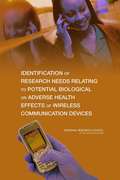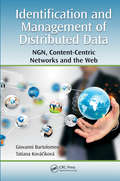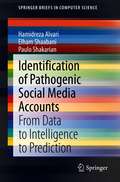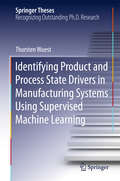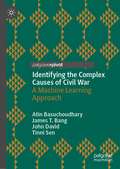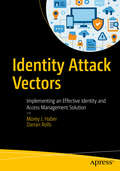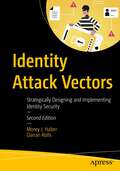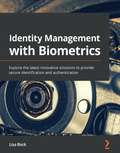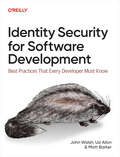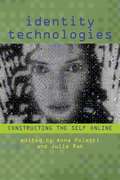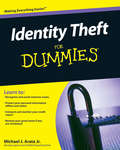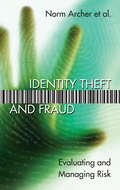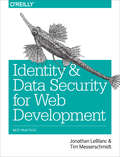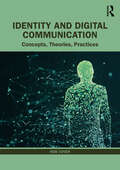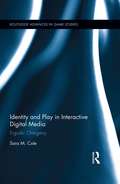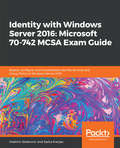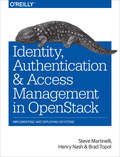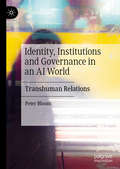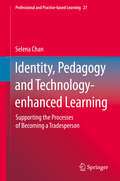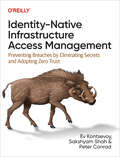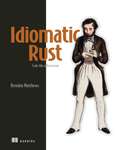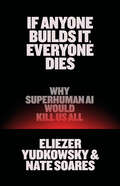- Table View
- List View
Identification Of Research Needs Relating To Potential Biological Or Adverse Health Effects Of Wireless Communication Devices
by National Research Council of the National AcademiesIn recent years there has been a rapid increase in the use of wireless communications devices and a great deal of research has been carried out to investigate possible biological or human health effects resulting from their use. The U.S. Food and Drug Administration asked the National Research Council to organize a workshop to identify research needs and gaps in knowledge in the areas of dosimetry and exposure, epidemiology, human laboratory studies, mechanisms, and animal and cell biology. The workshop did not include the evaluation of health effects or the generation of recommendations relating to how identified research needs should be met. Some needs and gaps identified at the workshop include: (1) characterization of exposures from wireless devices and RF base station antennas in juveniles, children, fetuses, and pregnant women and (2) evaluation of devices that use newer technologies (e.g., texting, web-surfing).
Identification and Management of Distributed Data: NGN, Content-Centric Networks and the Web
by Giovanni Bartolomeo Tatiana KovacikovaAlthough several books and academic courses discuss data management and networking, few of them focus on the convergence of networking and software technologies for identifying, addressing, and managing distributed data. Focusing on this convergence, Identification and Management of Distributed Data: NGN, Content-Centric Networks and the Web collat
Identification and Mitigation of Fraudulent Online Transactions Using Authentication and Fraud Detection System (Studies in Smart Technologies)
by Vikrant Bhateja Vipin Khattri Sandeep Kumar Nayak Deepak Kumar SinghThe book explores comprehensive demonstration of the performance analytics following the implementation of the authentication and fraud detection system strategies. These evaluations are based on different performance metrics such as accuracy, true positive rate, true negative rate, precision, g-mean, f1-score and receiver operating characteristic curve. This book highlights effectiveness of the implemented authentication and fraud detection system based on their performance statistics. Additionally, it explores the limitations and social impact of the developed online transaction system, offering insights into potential areas for future research.
Identification of Pathogenic Social Media Accounts: From Data to Intelligence to Prediction (SpringerBriefs in Computer Science)
by Paulo Shakarian Elham Shaabani Hamidreza AlvariThis book sheds light on the challenges facing social media in combating malicious accounts, and aims to introduce current practices to address the challenges. It further provides an in-depth investigation regarding characteristics of “Pathogenic Social Media (PSM),”by focusing on how they differ from other social bots (e.g., trolls, sybils and cyborgs) and normal users as well as how PSMs communicate to achieve their malicious goals. This book leverages sophisticated data mining and machine learning techniques for early identification of PSMs, using the relevant information produced by these bad actors. It also presents proactive intelligence with a multidisciplinary approach that combines machine learning, data mining, causality analysis and social network analysis, providing defenders with the ability to detect these actors that are more likely to form malicious campaigns and spread harmful disinformation. Over the past years, social media has played a major role in massive dissemination of misinformation online. Political events and public opinion on the Web have been allegedly manipulated by several forms of accounts including “Pathogenic Social Media (PSM)” accounts (e.g., ISIS supporters and fake news writers). PSMs are key users in spreading misinformation on social media - in viral proportions. Early identification of PSMs is thus of utmost importance for social media authorities in an effort toward stopping their propaganda. The burden falls to automatic approaches that can identify these accounts shortly after they began their harmful activities. Researchers and advanced-level students studying and working in cybersecurity, data mining, machine learning, social network analysis and sociology will find this book useful. Practitioners of proactive cyber threat intelligence and social media authorities will also find this book interesting and insightful, as it presents an important and emerging type of threat intelligence facing social media and the general public.
Identifying Product and Process State Drivers in Manufacturing Systems Using Supervised Machine Learning
by Thorsten WuestThe book reports on a novel approach for holistically identifying the relevant state drivers of complex, multi-stage manufacturing systems. This approach is able to utilize complex, diverse and high-dimensional data sets, which often occur in manufacturing applications, and to integrate the important process intra- and interrelations. The approach has been evaluated using three scenarios from different manufacturing domains (aviation, chemical and semiconductor). The results, which are reported in detail in this book, confirmed that it is possible to incorporate implicit process intra- and interrelations on both a process and programme level by applying SVM-based feature ranking. In practice, this method can be used to identify the most important process parameters and state characteristics, the so-called state drivers, of a manufacturing system. Given the increasing availability of data and information, this selection support can be directly utilized in, e. g. , quality monitoring and advanced process control. Importantly, the method is neither limited to specific products, manufacturing processes or systems, nor by specific quality concepts.
Identifying the Complex Causes of Civil War: A Machine Learning Approach
by Atin Basuchoudhary James T. Bang Tinni Sen John DavidThis book uses machine-learning to identify the causes of conflict from among the top predictors of conflict. This methodology elevates some complex causal pathways that cause civil conflict over others, thus teasing out the complex interrelationships between the most important variables that cause civil conflict. Success in this realm will lead to scientific theories of conflict that will be useful in preventing and ending civil conflict. After setting out a current review of the literature and a case for using machine learning to analyze and predict civil conflict, the authors lay out the data set, important variables, and investigative strategy of their methodology. The authors then investigate institutional causes, economic causes, and sociological causes for civil conflict, and how that feeds into their model. The methodology provides an identifiable pathway for specifying causal models. This book will be of interest to scholars in the areas of economics, political science, sociology, and artificial intelligence who want to learn more about leveraging machine learning technologies to solve problems and who are invested in preventing civil conflict.
Identity Attack Vectors: Implementing an Effective Identity and Access Management Solution
by Morey J. Haber Darran RollsDiscover how poor identity and privilege management can be leveraged to compromise accounts and credentials within an organization. Learn how role-based identity assignments, entitlements, and auditing strategies can be implemented to mitigate the threats leveraging accounts and identities and how to manage compliance for regulatory initiatives.As a solution, Identity Access Management (IAM) has emerged as the cornerstone of enterprise security. Managing accounts, credentials, roles, certification, and attestation reporting for all resources is now a security and compliance mandate. When identity theft and poor identity management is leveraged as an attack vector, risk and vulnerabilities increase exponentially. As cyber attacks continue to increase in volume and sophistication, it is not a matter of if, but when, your organization will have an incident. Threat actors target accounts, users, and their associated identities, to conduct their malicious activities through privileged attacks and asset vulnerabilities. Identity Attack Vectors details the risks associated with poor identity management practices, the techniques that threat actors and insiders leverage, and the operational best practices that organizations should adopt to protect against identity theft and account compromises, and to develop an effective identity governance program. What You Will Learn Understand the concepts behind an identity and how their associated credentials and accounts can be leveraged as an attack vectorImplement an effective Identity Access Management (IAM) program to manage identities and roles, and provide certification for regulatory complianceSee where identity management controls play a part of the cyber kill chain and how privileges should be managed as a potential weak linkBuild upon industry standards to integrate key identity management technologies into a corporate ecosystemPlan for a successful deployment, implementation scope, measurable risk reduction, auditing and discovery, regulatory reporting, and oversight based on real-world strategies to prevent identity attack vectors Who This Book Is For Management and implementers in IT operations, security, and auditing looking to understand and implement an identity access management program and manage privileges in these environments
Identity Attack Vectors: Strategically Designing and Implementing Identity Security, Second Edition
by Morey J. Haber Darran RollsToday, it’s easier for threat actors to simply log in versus hack in. As cyberattacks continue to increase in volume and sophistication, it’s not a matter of if, but when, your organization will have an incident. Threat actors target accounts, users, and their associated identities—whether human or machine, to initiate or progress their attack. Detecting and defending against these malicious activities should be the basis of all modern cybersecurity initiatives.This book details the risks associated with poor identity security hygiene, the techniques that external and internal threat actors leverage, and the operational best practices that organizations should adopt to protect against identity theft, account compromises, and to develop an effective identity and access security strategy. As a solution to these challenges, Identity Security has emerged as a cornerstone of modern Identity and Access Management (IAM) initiatives. Managing accounts, credentials, roles, entitlements, certifications, and attestation reporting for all identities is now a security and regulatory compliance requirement. In this book, you will discover how inadequate identity and privileged access controls can be exploited to compromise accounts and credentials within an organization. You will understand the modern identity threat landscape and learn how role-based identity assignments, entitlements, and auditing strategies can be used to mitigate the threats across an organization’s entire Identity Fabric. What You Will Learn Understand the concepts behind an identity and how its associated credentials and accounts can be leveraged as an attack vectorImplement an effective identity security strategy to manage identities and accounts based on roles and entitlements, including the most sensitive privileged accountsKnow the role that identity security controls play in the cyber kill chain and how privileges should be managed as a potential weak linkBuild upon industry standards and strategies such as Zero Trust to integrate key identity security technologies into a corporate ecosystemPlan for a successful identity and access security deployment; create an implementation scope and measurable risk reduction; design auditing, discovery, and regulatory reporting; and develop oversight based on real-world strategies to prevent identity attack vectors Who This Book Is For Management and implementers in IT operations, security, and auditing looking to understand and implement an Identity and Access Management (IAM) program and manage privileges in these environments
Identity Management with Biometrics: Explore the latest innovative solutions to provide secure identification and authentication
by Lisa BockIdentity Management with Biometrics is for IT managers, security professionals, students, teachers, and anyone involved in selecting, purchasing, integrating, or securing a biometric system. This book will help you understand how to select the right biometric system for your organization and walk you through the steps for implementing identity management and authentication. A basic understanding of biometric authentication techniques, such as fingerprint and facial recognition, and the importance of providing a secure method of authenticating an individual will help you make the most of the book.
Identity Security for Software Development
by John Walsh Uzi Ailon Matt BarkerMaintaining secrets, credentials, and nonhuman identities in secure ways is an important, though often overlooked, aspect of secure software development. Cloud migration and digital transformation have led to an explosion of nonhuman identities—like automation scripts, cloud native apps, and DevOps tools—that need to be secured across multiple cloud and hybrid environments.DevOps security often addresses vulnerability scanning, but it neglects broader discussions like authentication, authorization, and access control, potentially leaving the door open for breaches. That's where an identity security strategy focused on secrets management can help.In this practical book, authors John Walsh and Uzi Ailon provide conceptual frameworks, technology overviews, and practical code snippets to help DevSecOps engineers, cybersecurity engineers, security managers, and software developers address use cases across CI/CD pipelines, Kubernetes and cloud native, hybrid and multicloud, automation/RPA, IOT/OT, and more. You'll learn:The fundamentals of authentication, authorization, access control, and secrets managementWhat developers need to know about managing secrets and identity to build safer appsWhat nonhuman identities, secrets, and credentials are—and how to secure themHow developers work with their cross-function peers to build safer appsHow identity security fits into modern software development practices
Identity Technologies
by Anna Poletti Julie Rak"Identity Technologies "is a substantial contribution to the fields of autobiography studies, digital studies, and new media studies, exploring the many new modes of self-expression and self-fashioning that have arisen in conjunction with Web 2. 0, social networking, and the increasing saturation of wireless communication devices in everyday life. This volume explores the various ways that individuals construct their identities on the Internet and offers historical perspectives on ways that technologies intersect with identity creation. Bringing together scholarship about the construction of the self by new and established authors from the fields of digital media and auto/biography studies, "Identity Technologies "presents new case studies and fresh theoretical questions emphasizing the methodological challenges inherent in scholarly attempts to account for and analyze the rise of identity technologies. The collection also includes an interview with Lauren Berlant on her use of blogs as research and writing tools.
Identity Theft For Dummies
by Michael J. Arata Jr.Practical solutions to help you deter, detect, and defend against identity theft In 2008, 9. 9 million Americans became victims of identity theft. The cost exceeded $48 billion in 2008; consumers spend some $5 billion out-of-pocket each year to clear up resulting fraud issues. This guide will help keep you from becoming the next victim. Written by a veteran security professional, Identity Theft For Dummies gives you the tools to recognize what information is vulnerable, minimize your risk, stay safe online, and practice damage control if your identity is compromised. If you have a name, a date of birth, and a Social Security number, you're a potential victim; this book helps you recognize your risk and defend against identity thieves Explains what identity theft is, how it happens, and how to recognize if you have become a victim Shows how to protect your personal information, how to be discreet in public places, how to interpret your credit report, and why you should monitor your financial statements Helps you recognize risks you may not have considered, such as what you set at the curb on trash day Provides advice on how to clear your name if you are victimized Identity Theft For Dummies arms you to fight back against this growing threat.
Identity Theft and Fraud: Evaluating and Managing Risk (Critical Issues in Risk Management)
by Junlian Xiang Norm Archer Susan Sproule Yufei Yuan Ken GuoPersonal data is increasingly being exchanged and stored by electronic means, making businesses, organizations and individuals more vulnerable than ever to identity theft and fraud. This book provides a practical and accessible guide to identity theft and fraud using a risk management approach. It outlines various strategies that can be easily implemented to help prevent identity theft and fraud. It addresses technical issues in a clear and uncomplicated way to help decision-makers at all levels understand the steps their businesses and organizations can take to mitigate identity theft and fraud risks. And it highlights the risks individuals face in this digital age. This book can help anyone – businesses and organizations of all sizes, as well as individuals – develop an identity theft and fraud prevention strategy that will reduce their risk and protect their identity assets. To date, little has been written on identity theft and fraud with a Canadian audience in mind. This book fills that gap, helping Canadians minimize their identity theft and fraud risks.
Identity and Data Security for Web Development: Best Practices
by Tim Messerschmidt Jonathan LeBlancDevelopers, designers, engineers, and creators can no longer afford to pass responsibility for identity and data security onto others. Web developers who don’t understand how to obscure data in transmission, for instance, can open security flaws on a site without realizing it. With this practical guide, you’ll learn how and why everyone working on a system needs to ensure that users and data are protected.Authors Jonathan LeBlanc and Tim Messerschmidt provide a deep dive into the concepts, technology, and programming methodologies necessary to build a secure interface for data and identity—without compromising usability. You’ll learn how to plug holes in existing systems, protect against viable attack vectors, and work in environments that sometimes are naturally insecure.Understand the state of web and application security todayDesign security password encryption, and combat password attack vectorsCreate digital fingerprints to identify users through browser, device, and paired device detectionBuild secure data transmission systems through OAuth and OpenID ConnectUse alternate methods of identification for a second factor of authenticationHarden your web applications against attackCreate a secure data transmission system using SSL/TLS, and synchronous and asynchronous cryptography
Identity and Digital Communication: Concepts, Theories, Practices
by Rob CoverThis comprehensive text explores the relationship between identity, subjectivity and digital communication, providing a strong starting point for understanding how fast-changing communication technologies, platforms, applications and practices have an impact on how we perceive ourselves, others, relationships and bodies. Drawing on critical studies of identity, behaviour and representation, Identity and Digital Communication demonstrates how identity is shaped and understood in the context of significant and ongoing shifts in online communication. Chapters cover a range of topics including advances in social networking, the development of deepfake videos, intimacies of everyday communication, the emergence of cultures based on algorithms, the authenticities of TikTok and online communication’s setting as a site for hostility and hate speech. Throughout the text, author Rob Cover shows how the formation and curation of self-identity is increasingly performed and engaged with through digital cultural practices, affirming that these practices must be understood if we are to make sense of identity in the 2020s and beyond. Featuring critical accounts, everyday examples and analysis of key platforms such as TikTok, this textbook is an essential primer for scholars and students in media studies, psychology, cultural studies, sociology, anthropology, computer science, as well as health practitioners, mental health advocates and community members.
Identity and Play in Interactive Digital Media: Ergodic Ontogeny (Routledge Advances in Game Studies)
by Sara M. ColeRecent shifts in new literacy studies have expanded definitions of text, reading/viewing, and literacy itself. The inclusion of non-traditional media forms is essential, as texts beyond written words, images, or movement across a screen are becoming ever more prominent in media studies. Included in such non-print texts are interactive media forms like computer or video games that can be understood in similar, though distinct, terms as texts that are read by their users. This book examines how people are socially, culturally, and personally changing as a result of their reading of, or interaction with, these texts. This work explores the concept of ergodic ontogeny: the mental development resulting from interactive digital media play experiences causing change in personal identity.
Identity with Windows Server 2016: Deploy, configure, and troubleshoot identity services and Group Policy in Windows Server 2016
by Vladimir Stefanovic Sasha KranjacEquip yourself with the most complete and comprehensive preparation experience for Identity with Windows Server 2016: Microsoft 70-742 exam. Key Features Helps you demonstrate real-world mastery of Windows Server 2016 identity features and functionality and prepare for 70-742 Acquire skills to reduce IT costs and deliver more business value Enhance your existing skills through practice questions and mock tests Book Description MCSA: Windows Server 2016 certification is one of the most sought-after certifications for IT professionals, which includes working with Windows Server and performing administrative tasks around it. This book is aimed at the 70-742 certification and is part of Packt's three-book series on MCSA Windows Server 2016 certification, which covers Exam 70-740, Exam 70-741, and Exam 70-742. This exam guide covers the exam objectives for the 70-742 Identity with Windows Server 2016 exam. It starts with installing and configuring Active Directory Domain Services (AD DS), managing and maintaining AD DS objects and advanced configurations, configuring Group Policy, Active Directory Certificate Services, and Active Directory Federation Services and Rights Management. At the end of each chapter, convenient test questions will help you in preparing for the certification in a practical manner. By the end of this book, you will be able to develop the knowledge and skills needed to complete MCSA Exam 70-742: Identity with Windows Server 2016 with confidence. What you will learn Install, configure, and maintain Active Directory Domain Services (AD DS) Manage Active Directory Domain Services objects Configure and manage Active Directory Certificate Services Configure and manage Group Policy Design, implement, and configure Active Directory Federation Services Implement and configure Active Directory Rights Management Services Who this book is for This book primarily targets system administrators who are looking to gain knowledge about identity and access technologies with Windows Server 2016 and aiming to pass the 70-742 certification. This will also help infrastructure administrators who are looking to gain advanced knowledge and understanding of identity and access technologies with Windows Server 2016. Familiarity with the concepts such as Active Directory, DNS is assumed.
Identity, Authentication, and Access Management in OpenStack: Implementing and Deploying Keystone
by Steve Martinelli Brad Topol Henry NashKeystone—OpenStack's Identity service—provides secure controlled access to a cloud’s resources. In OpenStack environments, Keystone performs many vital functions, such as authenticating users and determining what resources users are authorized to access.Whether the cloud is private, public, or dedicated, access to cloud resources and security is essential. This practical guide to using Keystone provides detailed, step-by-step guidance to creating a secure cloud environment at the Infrastructure-as-a-Service layer—as well as key practices for safeguarding your cloud's ongoing security.Learn about Keystone's fundamental capabilities for providing Identity, Authentication, and Access ManagementPerform basic Keystone operations, using concrete examples and the latest version (v3) of Keystone's Identity APIUnderstand Keystone's unique support for multiple token formats, including how it has evolved over timeGet an in-depth explanation of Keystone's LDAP support and how to configure Keystone to integrate with LDAPLearn about one of Keystone's most sought-after features—support for federated identity
Identity, Institutions and Governance in an AI World: Transhuman Relations
by Peter BloomThe 21st century is on the verge of a possible total economic and political revolution. Technological advances in robotics, computing and digital communications have the potential to completely transform how people live and work. Even more radically, humans will soon be interacting with artificial intelligence (A.I.) as a normal and essential part of their daily existence. What is needed now more than ever is to rethink social relations to meet the challenges of this soon-to-arrive "smart" world. This book proposes an original theory of trans-human relations for this coming future. Drawing on insights from organisational studies, critical theory, psychology and futurism - it will chart for readers the coming changes to identity, institutions and governance in a world populated by intelligent human and non-human actors alike. It will be characterised by a fresh emphasis on infusing programming with values of social justice, protecting the rights and views of all forms of "consciousness" and creating the structures and practices necessary for encouraging a culture of "mutual intelligent design". To do so means moving beyond our anthropocentric worldview of today and expanding our assumptions about the state of tomorrow's politics, institutions, laws and even everyday existence. Critically such a profound shift demands transcending humanist paradigms of a world created for and by humans and instead opening ourselves to a new reality where non-human intelligence and cyborgs are increasingly central.
Identity, Pedagogy and Technology-enhanced Learning: Supporting the Processes of Becoming a Tradesperson (Professional and Practice-based Learning #27)
by Selena ChanThis book gathers work from over a decade of study, and seeks to better understand and support how learners become tradespeople. The research programme applies recent concepts from neuroscience, educational psychology and technology-enhanced learning to explain and help overcome the challenges of learning in trades-learning contexts. Due to the complex and multifarious nature of the work characterising trade occupations, learning how to become a tradesperson requires a significant commitment in terms of time, along with physical and cognitive effort. All modalities (visual, aural, haptic etc.) and literacies (text, numerical, spatial etc.) are required when undertaking trade work. Manual dexterity and strength, coupled with the technical and tacit knowledge required for complex problem solving, not to mention suitable dispositional approaches, must all be learnt and focused on becoming a tradesperson.However, there is a substantial gap in the literature on 'how people learn a trade' and 'how to teach a trade'. In this book, contemporary teaching and learning approaches and strategies, as derived through practice-based participatory research, are used to highlight and discuss pragmatic solutions to facilitate the learning and teaching of trade skills, knowledge and dispositions. The approaches and strategies discussed include the implementation of technology-enhanced learning; project-based inquiry/problem-based learning; and recommendations to ensure learners are prepared for the future of work.
Identity-Native Infrastructure Access Management: Preventing Breaches by Eliminating Secrets and Adopting Zero Trust
by Peter Conrad Ev Kontsevoy Sakshyam ShahTraditional secret-based credentials can't scale to meet the complexity and size of cloud and on-premises infrastructure. Today's applications are spread across a diverse range of clouds and colocation facilities, as well as on-prem data centers. Each layer of this modern stack has its own attack vectors and protocols to consider.How can you secure access to diverse infrastructure components, from bare metal to ephemeral containers, consistently and simply? In this practical book, authors Ev Kontsevoy, Sakshyam Shah, and Peter Conrad break this topic down into manageable pieces. You'll discover how different parts of the approach fit together in a way that enables engineering teams to build more secure applications without slowing down productivity.With this book, you'll learn:The four pillars of access: connectivity, authentication, authorization, and auditWhy every attack follows the same pattern, and how to make this threat impossibleHow to implement identity-based access across your entire infrastructure with digital certificatesWhy it's time for secret-based credentials to go awayHow to securely connect to remote resources including servers, databases, K8s Pods, and internal applications such as Jenkins and GitLabAuthentication and authorization methods for gaining access to and permission for using protected resources
Idiomatic Rust: Code like a Rustacean
by Brenden MatthewsTips, tricks, design patterns, and secret features of Rust that will help you build stable and maintainable applications.Whether you&’re a Rust beginner or a pro, Idiomatic Rust will teach you to be a better Rust programmer. It introduces essential design patterns for Rust software with detailed explanations, and code samples that encourage you to get stuck in. In Idiomatic Rust you&’ll learn how to apply important design patterns including: • Fluent interfaces for creating delightful APIs • The Builder pattern to encapsulate data and perform initialization • Immutable data structures that help you avoid hard-to-debug data race conditions • Functional programming patterns • Anti-patterns and what not to do in Rust Idiomatic Rust catalogs, documents, and describes both how classic design patterns work with Rust, and the new Rust-specific patterns that will help you master the language. Each pattern or best practice helps solve common programming problems and ensure your code is easy for others to understand. You&’ll learn when to use each pattern—and when to break it! You&’ll soon be producing higher-quality Rust code and higher-quality Rust software. About the technology After you&’re comfortable with Rust&’s syntax and its uniquely-powerful compiler, there&’s a whole new dimension to explore as you put it to use in real projects. How do you apply standard design patterns in Rust applications? Where and why should you use IntoIterator? Why do Rustaceans love the PhantomData type? This book answers these questions and many, many more. About the book Idiomatic Rust introduces the coding and design patterns you&’ll need to take advantage of Rust&’s unique language design. This book&’s clear explanations and reusable code examples help you explore metaprogramming, build your own libraries, create fluent interfaces, and more. Along the way, you&’ll learn how to write efficient, idiomatic Rust code that&’s easy to maintain and evolve as you learn how the language works under the hood. What's inside • Creating delightful APIs • Applying Builder and other classic design patterns • Functional programming patterns • Rust anti-patterns About the reader For intermediate Rust programmers. About the author Brenden Matthews is a member of the Apache Software Foundation, creator of the system monitor Conky, and author of Code Like a Pro in Rust. The technical editor on this book was Alain M Couniot. Table of Contents PART 1 1 Rust-y patterns 2 Rust&’s basic building blocks 3 Code flow PART 2 4 Introductory patterns 5 Design patterns: Beyond the basics 6 Designing a library PART 3 7 Using traits, generics, and structs for specialized tasks 8 State machines, coroutines, macros, and preludes PART 4 9 Immutability 10 Antipatterns A Installing Rust
Idiot: Life Stories from the Creator of Help Helen Smash
by Laura CleryFrom YouTube star and Facebook Video sensation Laura Clery comes a collection of comedic essays in the vein of We Are Never Meeting in Real Life by Samantha Irby and You’ll Grow Out of It by Jessi Klein.Laura Clery makes a living by sharing inappropriate comedy sketches with millions of strangers on the Internet. She writes songs about her anatomy, talks trash about her one-eyed rescue pug, and sexually harasses her husband, Stephen. And it pays the bills! Now, in her first-ever book, Laura recounts how she went from being a dangerously impulsive, broke, unemployable, suicidal, cocaine-addicted narcissist, crippled by fear and hopping from one toxic romance to the next…to a more-happy-than-not, somewhat rational, meditating, vegan yogi with good credit, a great marriage, a fantastic career, and four unfortunate-looking rescue animals. Still, above all, Laura remains an amazingly talented, adorable, and vulnerable, self-described…Idiot. With her signature brand of offbeat, no-holds-barred humor, Idiot introduces you to a wildly original—and undeniably relatable—new voice.
Idiots: Marriage, Motherhood, Milk & Mistakes
by Laura CleryA fresh, hilarious, and relatable collection of essays about everything from motherhood and marriage to sobriety and work-life balance (or imbalance) from the nationally bestselling author of the &“honest, complicated&” (SheKnows) Idiot.TRIGGER WARNING: TORN EVERYTHING! In her first book, Idiot, bestselling author Laura Clery gave us mind-blowingly personal life stories about addiction, toxic relationships, and recovery—establishing herself as the preeminent voice of infinite conviction meets zero impulse control. Here she is two kids later asking, &“How did we get here?&” Sex. Sex is how we got here. Laura&’s life has changed a great deal since she wrote Idiot, but her hilarious candor has only increased with motherhood—plus she tells some of the stories she was too scared to tell in her first book (which is really saying something). In Idiots, Laura shares more than anyone ever asked for about: -Mucus plugs, vacuum extraction, and adult diapers -Dousing doulas, VagTime, and pelvic organ prolapse -Vaginismus, laxative overdose, and accidental lactivism -Placenta pills, mom brain, and vibrator manifestation -Nipple-twisting orgies and flinging a butt burrito in your doctor&’s face -ADHD, autism, postpartum depression, and the wisdom of a ninety-eight-year-old sage named Anne -Unsolicited dick, sexual assault, and sister-drugging -Stephen&’s cheating, Laura&’s cheating, fights, and forgiveness -Choosing love over fear and healing the world Laura does not hold back when it comes to sharing stories of screw-ups, triumphs, and learning from her mistakes. Whether she&’s crying into a diaper in a Whole Foods parking lot or desperately soliciting advice from a random elderly stranger (who has most certainly considered a restraining order), Laura is able to laugh at herself even during her worst moments—more important, she makes us laugh, cry, and feel less alone in the world.
If Anyone Builds It, Everyone Dies: Why Superhuman AI Would Kill Us All
by Eliezer Yudkowsky Nate SoaresINSTANT NEW YORK TIMES BESTSELLER | The scramble to create superhuman AI has put us on the path to extinction—but it&’s not too late to change course, as two of the field&’s earliest researchers explain in this clarion call for humanity. "May prove to be the most important book of our time.&”—Tim Urban, Wait But Why In 2023, hundreds of AI luminaries signed an open letter warning that artificial intelligence poses a serious risk of human extinction. Since then, the AI race has only intensified. Companies and countries are rushing to build machines that will be smarter than any person. And the world is devastatingly unprepared for what would come next. For decades, two signatories of that letter—Eliezer Yudkowsky and Nate Soares—have studied how smarter-than-human intelligences will think, behave, and pursue their objectives. Their research says that sufficiently smart AIs will develop goals of their own that put them in conflict with us—and that if it comes to conflict, an artificial superintelligence would crush us. The contest wouldn&’t even be close. How could a machine superintelligence wipe out our entire species? Why would it want to? Would it want anything at all? In this urgent book, Yudkowsky and Soares walk through the theory and the evidence, present one possible extinction scenario, and explain what it would take for humanity to survive. The world is racing to build something truly new under the sun. And if anyone builds it, everyone dies.&“The best no-nonsense, simple explanation of the AI risk problem I've ever read.&”—Yishan Wong, Former CEO of Reddit
